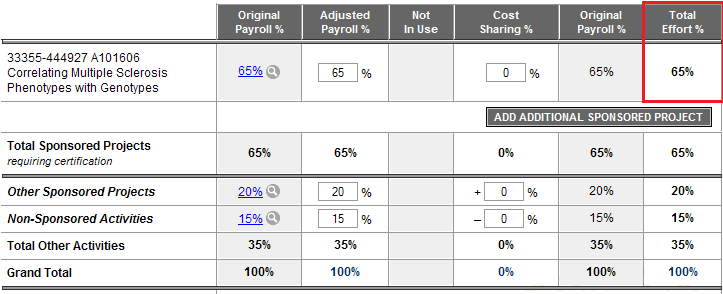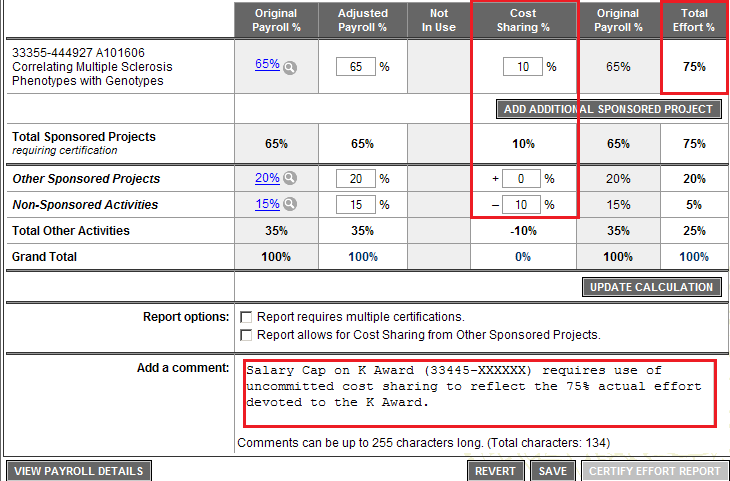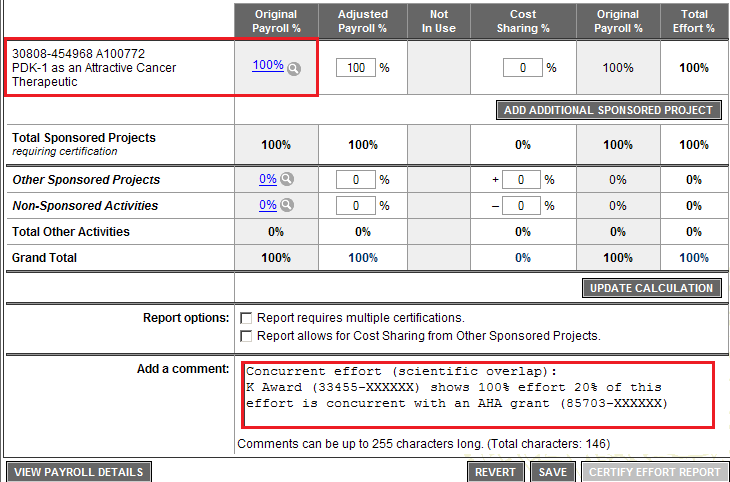Overview
This guide covers effort reporting and the web-based Effort Reporting System (ERS) used to ensure compliance with Uniform Guidance requirements.
In April 2021, UCSF implemented the award verification procedure to support Principal Investigators (PIs) in meeting the requirements of the Uniform Guidance for federal awards. With the transition to award verification, PIs ceased certifying effort using the Effort Reporting System (ERS).
- Contracts & Grants Accounting (CGA) retired ERS on June 30, 2022.
- The last effort reporting certification cycle at UCSF was completed in August 2020 for the period of January 1 through May 2, 2020.
- All effort reports, including related certification activity through June 30, 2022, have been archived.
This page describes the effort reporting procedure UCSF used prior to the implementation of award verification.
Effort reporting is the method used to confirm to sponsors that the effort spent on a sponsored agreement reasonably reflects the salary and wages charged to that agreement. An effort report is an after-the-fact reporting of activities for which the employee was compensated by the institution.
- Effort reports are required for all employees paid from federally sponsored agreements. If any portion of pay was from a federally sponsored agreement during the reporting period, an effort report is required.
- Effort reports substantiate the effort expended by an employee in fulfilling the employee's obligation to the University.
- The effort report details both the percent of effort spent on a project and the percent of salary charged to that project.
The Effort Reporting System (ERS) is a web-based tool to enable the University to meet the reporting requirements of the Uniform Guidance. As recipients of federal funding, educational institutions must abide by Title 2 Code of Federal Regulations (2 CFR), part 220 (formerly Office of Management and Budget Circular A-21). 2CFR, part 220 requires an effort certification system that:
- Encompasses all employee activities (100% effort)
- Confirms effort expended after-the-fact
- Requires certification to be performed by an individual who has first-hand knowledge or used suitable means of verification to determine if the work was performed
- Requires certification to be encompassed in the institution's official records
ERS calculates the distribution of effort for all employees paid from federal and federal flow-through funds, captures certification electronically, and provides a mechanism for processing corrections and re-certifying reports.
For University personnel who are paid on or have commitments on federal contract and grant funds, a certification of effort must be completed by the employee or responsible official certifying the percentage of his or her total work effort applicable to sponsored research.
- PIs and other faculty in Professorial, Professional Research, and Management titles are required to certify their own effort since they are in the best position to understand how they are spending their time in support of the various activities in which they are engaged. This is consistent with the OMB Circular A-21 requirement that the distribution of salaries and wages be supported by activity reports that are confirmed by a “responsible person with suitable means of verification that the work was performed.”
- The effort of staff employees who are paid on or have commitments to work on federal or federal flow-through funds must be certified by the PI, employee, or other designated official with suitable means of verification that the work was performed.
- Other designated certifiers may be a co-principal investigator, lab manager, or direct supervisor who has first-hand knowledge of the employee’s effort.
- Suitable means of verification includes, but is not limited to, (i) time records that include effort distribution that have been signed by the employee and/or supervisor, (ii) written documents including email messages from the principal investigator confirming the distribution of effort, or (c) department-created reports that include effort distribution and are signed by the employee, supervisor, or the principal investigator.
- To certify as an “Other Designated Certifier”, approval must be obtained from CGA.
The Uniform Guidance provides for “a degree of tolerance” in the preciseness of effort reporting. According to the UCOP Contract and Grant Manual, section 7-330 Confirmation of Personal Services, each site is allowed to define the preciseness level appropriate for their campus. UCSF has defined the preciseness tolerance at +/- 5%. Therefore, individuals may certify a level of effort for an award or activity that is within five percentage points of their best estimate of the actual effort expended during the reporting period.
Failure to certify effort accurately and on a timely basis may result in the charge being disallowed by the federal agency funding the research. UC San Francisco is committed to ensuring that effort reports made in connection with federally sponsored agreements are accurate, timely, reasonably reflect the actual level of effort expended, and comply with all federal requirements. UC San Francisco is further committed to ensuring that effort reports are certified within 120 days of the end of the reporting period. Each department is responsible for establishing a business process to certify effort reports on a timely basis. If certification is past due, CGA will follow the established Effort Report Escalation Process and work with departments who must follow up with their PIs and other certifiers to ensure that the delinquent effort reports are certified as quickly as possible. Effort reports that are not certified within 120 days may result in action being taken by the campus to reverse the charges on the award, may jeopardize submission of future proposals, cause a proposal to be withdrawn, and/or jeopardize the acceptance of future awards.
Cost sharing represents the portion of costs that are not borne by to the sponsor but by the University or other third-party sources. Cost sharing commitments are made at the time of the proposal. If the proposal is awarded, the institution is then obligated to meet those commitments (“committed cost share”). Federal regulations require that only committed cost shared effort be certified. Uncommitted cost sharing (effort that was spent on the project but was not included as part of the proposal or award) and non-effort based commitments, such as equipment or supplies, are not part of effort certification.
Effort Reporting and K Awards
Under K awards, mentored and non-mentored CDA candidates are required to devote and maintain a minimum level of effort to the award. Since K awards require that a minimal amount of effort is expected and not necessarily quantifiable in terms of a percentage of the total award amount, no cost sharing needs to be reported or tracked. Effort only needs to be reported if it falls below the minimum required threshold which has to be approved by the sponsoring agency. If the effort falls below the minimum threshold, supplementation may be reported. There is no requirement that the department file cost sharing paperwork with CGA, no need for CGA to set up a cost sharing program code, and no need to specifically charge part of the salary to a designated cost sharing program code.
Issue 1 – Minimum Effort under a K Award Salary Cap
When the capped salary is less than the minimum effort level multiplied by the career researcher's pay rate, ERS will report less effort than required by the K Award. For example, regarding a K01 from the NIH National Institute on Aging, assume the following:
- K award requires a minimum effort level of 75%.
- K award direct salary is capped at $75,000.
- The career researcher's pay rate is $115,385.
In this example, 75% of $115,385 = $86,538, which is over the K award's salary cap. However, the effort report should certify 75% effort on the K award.
ERS will generate an Effort Report similar to the one below (33445-XXXXXX represents the K Award). In this case, the Total Effort % shows as 65% due to the cap on the K Award direct salary.
The effort should be modified using the cost sharing column of the effort report, taking effort from the Non-Sponsored Activities group (in rare cases you may be able to cost share from the Other Sponsored Projects group, but it is up to your private sponsors to approve this use of their funding).
The adjusted Effort Report will look like this:
It is important to understand that this use of the cost sharing column is considered "uncommitted" cost sharing and will be reported only on the effort report. There is no requirement that the department file cost sharing paperwork with CGA, no need for CGA to set up a cost sharing program code, and no need to specifically charge part of the salary to a designated cost sharing program code. A Payroll Expense Transfer Uploader (PETU) is not needed for this situation.
In this case, before certifying the Effort Report, a comment must be added to the Effort Report explaining why Cost Sharing was used. The comment text should read: “Salary Cap on K Award (33445-XXXXXX) requires use of uncommitted cost sharing to reflect the 75% actual effort devoted to the K Award.”
Issue 2 – Concurrent Effort (scientific overlap) with Other Sponsored Projects
When a K award recipient has been approved for sharing K Award effort with another sponsored project, the department should have set up the appropriate Program Code within the K Award’s Project and charged a percentage of the recipient’s salary to that Program Code to demonstrate the shared effort between the K Award and the other sponsored project. See University of California Effort Reporting System: Cost Sharing for an explanation of cost sharing.
Because ERS does not track certified effort for other sponsored projects, the Reviewer (or PI) for the K Award should:
- review the payroll entries by clicking on the Original Payroll % for K Award to see that payroll is in fact shared with the other sponsored project
- enter the details of the effort sharing in the Comments section of the Effort Report using language such as:
“Concurrent Effort (scientific overlap):
K Award (33455-XXXXXX) shows 100% effort
20% of this effort is concurrent with an AHA grant (85703-XXXXXX)”
In this example, 33455-XXXXXX is the K Award:
Related Topics
Refer to the Award Verification section of the Controller's Office website for the current procedure used by UCSF to meet federal guidelines under Uniform Guidance and UCSF Campus Administrative Policy 300-19, including escalations for late verifications.



